BY SUSAN ROSE
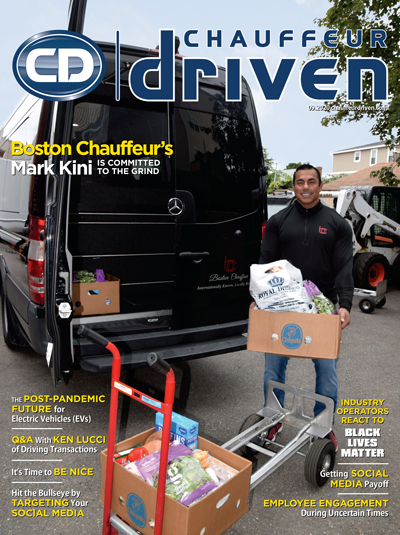 Cover Art:Boston Chauffeur CEO Mark Kini loads his company’s Sprinter to help deliver boxes of food to his community for Everett Grace Food Pantry and Outreach. Photography by Chris Weiss.
We’re 35 minutes into our interview when Mark Kini says that he has to put me on hold for a second time to answer another client call. When the Boston Chauffeur founder and CEO returns, he apologizes but is clearly excited.
Cover Art:Boston Chauffeur CEO Mark Kini loads his company’s Sprinter to help deliver boxes of food to his community for Everett Grace Food Pantry and Outreach. Photography by Chris Weiss.
We’re 35 minutes into our interview when Mark Kini says that he has to put me on hold for a second time to answer another client call. When the Boston Chauffeur founder and CEO returns, he apologizes but is clearly excited.
“I’ve been going back and forth with this client for a week now and she just asked me to send her the contract to sign. If I wasn’t on the front lines answering the phones, and if I wasn’t willing to try new things, then I would have missed some of these trends that are able to move my business forward,” he says.
Some days, he says he has about 10 jobs booked locally, while other times he has to sub out some work, and sometimes nothing at all. But the phone is ringing.
Manning his office lines wasn’t how Kini envisioned 2020 would shake out for the 20-year-old Boston-based company, which was already shaping up to be 20 percent year over year, and no one guessed we’d still be talking about the first wave of COVID in September. However, he’s found comfort in the discipline and the regimen he’s set for himself and his company.
Now that we are more than six months in, Kini’s routine involves handling calls for 120 hours a week interspersed with mining for opportunities, a weekly Zoom meeting with like-minded operators, tightening procedures and shoring up any operational weaknesses, and some self-reflection and self-improvement by working with his trio of consultants (business, life, and health).
Few businesses in this industry—and travel/hospitality overall—are currently where they want to be, but Kini sees this as an opportunity, even a blessing, to be able to renew what he calls his commitment to the grind.
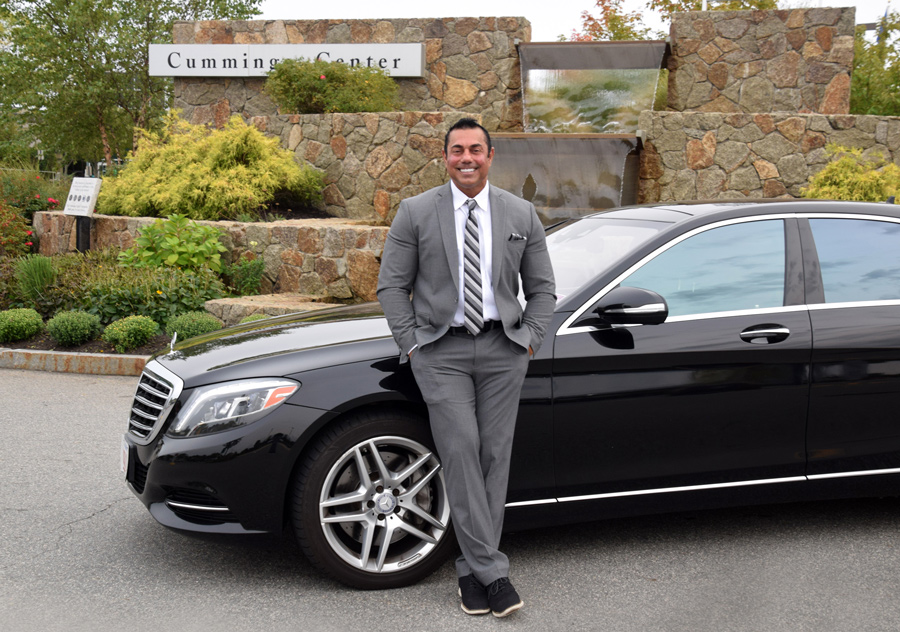 Boston Chauffeur CEO Mark Kini with one of his Mercedes-Benz S-Class sedans, at his corporate headquarters in Beverly, Mass.
“To be perfectly candid, in the beginning I was really resentful about what was happening,” he says. “It was such a shock to my day-to-day life. I took it personally when I had to lay off my team because not having to lay off an employee over my 20 years in business was something I was proud of. I had to have a ‘come to Jesus’ moment and really shift my mindset. I had to look at this as an opportunity, because they do exist if you’re willing to look. It was in that moment that I felt like a weight had been lifted from my shoulders. I’m making myself available to those possibilities.”
Boston Chauffeur CEO Mark Kini with one of his Mercedes-Benz S-Class sedans, at his corporate headquarters in Beverly, Mass.
“To be perfectly candid, in the beginning I was really resentful about what was happening,” he says. “It was such a shock to my day-to-day life. I took it personally when I had to lay off my team because not having to lay off an employee over my 20 years in business was something I was proud of. I had to have a ‘come to Jesus’ moment and really shift my mindset. I had to look at this as an opportunity, because they do exist if you’re willing to look. It was in that moment that I felt like a weight had been lifted from my shoulders. I’m making myself available to those possibilities.”
Part of that process was embracing change—a lot of change—which involved reducing his team from 30 to 10, right-sizing his fleet, working with lenders and vendors, and identifying every cost-saving measure he could by going line by line on his P&L. The latest change, which he is currently in the middle of, is scaling down his office space, a location that is conveniently within the same corporate park as his previous office and can accommodate about six office staff comfortably with social distancing.
He’s also onboarding two new employees to replace others who unfortunately had to accept other positions. Just recently he welcomed Kristen Burt, his new office manager/bookkeeper, and Frank Moss, a 33-year industry veteran who was brought on as logistics manager to handle a lot of the operational duties.
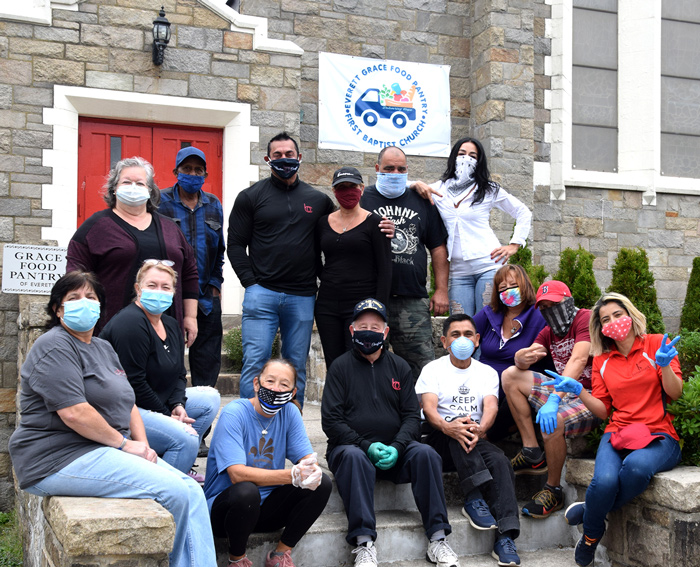 Kini (standing, black jacket) with the crew of the Everett Grace Food Pantry and Outreach
“This is a really key time to drill down and get back to basics. For us, we didn’t have a clear onboarding process in place. It’s something that I’m much more in tune to now, but I wish I was years back. The focus is on rebuilding a team and then giving competent employees autonomy to grow with the business,” he says.
Kini (standing, black jacket) with the crew of the Everett Grace Food Pantry and Outreach
“This is a really key time to drill down and get back to basics. For us, we didn’t have a clear onboarding process in place. It’s something that I’m much more in tune to now, but I wish I was years back. The focus is on rebuilding a team and then giving competent employees autonomy to grow with the business,” he says.
In the early days of the pandemic, Kini was vigilant and spent countless hours to secure the funding that was made available to small businesses through the Paycheck Protection Program (PPP) and the fully replenished Economic Injury Disaster Loans (EIDLs). He built up his reserves of cash, but was also faced with the challenge of what to do with employees when he didn’t have much work.
“I brought a lot of the office staff back for customer service training and to stay in touch with clients,” he says. “We invested heavily in implementing and marketing a food shopping and delivery service at a time when people were really scared about the virus and did not want to go to stores. We tried it, but it didn’t really pan out.”
On happenstance, he saw an online post from a good friend who was working with the Everett Grace Food Pantry and Outreach—a local food bank—and he messaged her to see if he could help. Around the country, these services have been responsible for keeping millions of food-insecure families healthy and nourished, but the demand skyrocketed for people of all socio-economic backgrounds when the pandemic hit.
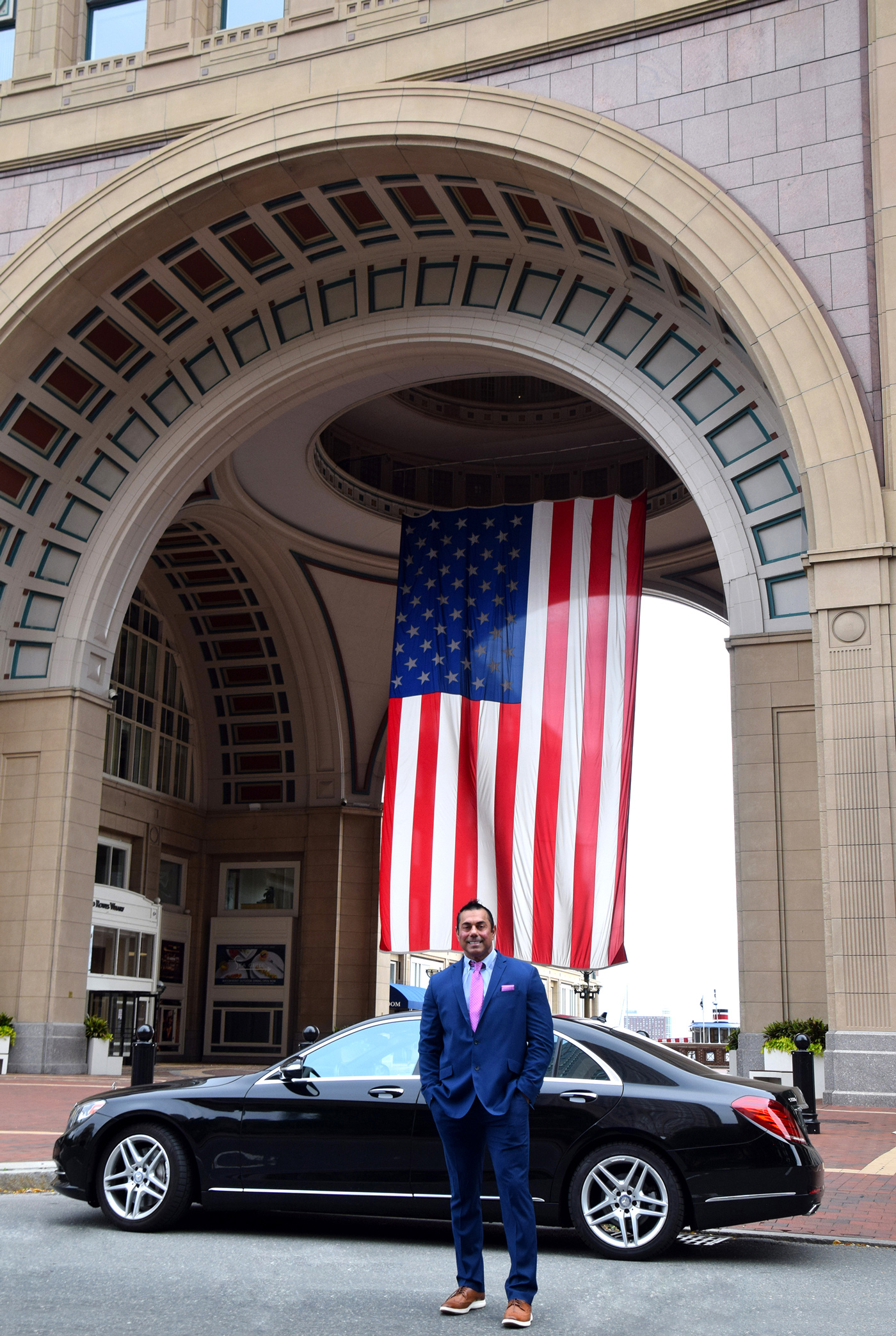 Kini at the Boston Harbor Hotel
“We started doing food deliveries for the elderly, veterans, and families that were quarantined. I realized that I had the drivers who needed to keep busy while we utilized the full eight weeks of the PPP, and I continued with the relationship after the PPP ran out,” he says. Kini regularly donates his time as does his chauffeur Jim Davis, whom they affectionately call “The Veteran” due to his time in the Navy.
Kini at the Boston Harbor Hotel
“We started doing food deliveries for the elderly, veterans, and families that were quarantined. I realized that I had the drivers who needed to keep busy while we utilized the full eight weeks of the PPP, and I continued with the relationship after the PPP ran out,” he says. Kini regularly donates his time as does his chauffeur Jim Davis, whom they affectionately call “The Veteran” due to his time in the Navy.
“It’s been a blessing because working with them has been like chicken soup for my soul. It’s a family environment there: The volunteers are police officers, firemen, teachers, small business owners, and other town employees. The last time I worked we fed more than 3,000 people—it’s really insane the number of people in need of food.”
More recently, Everett Grace distributed 250 backpacks and school supplies just before the start of the school year. Another time, Target gift cards were donated.
Irene Cardillo, director of the Everett Grace Food Pantry and Outreach, is thankful for Kini’s assistance and continued dedication to the organization and community.
“Mark came to us through a mutual friend and said, ‘No one is using our vehicles right now, so how can we help?’ His drivers would come every morning after we made the boxes, and they would deliver to our families. And the families laughed about having their food delivered by a chauffeur,” she says.
Kini continues to work with the pantry, and consistently assists on Saturdays for the mission’s open pantry day. Prior to the pandemic, Everett Grace assisted about 3,000 families monthly, but Cardillo estimates that it’s now about 10,000 families. The mission is part of the Greater Boston Food Bank, which serves the entire regional area.
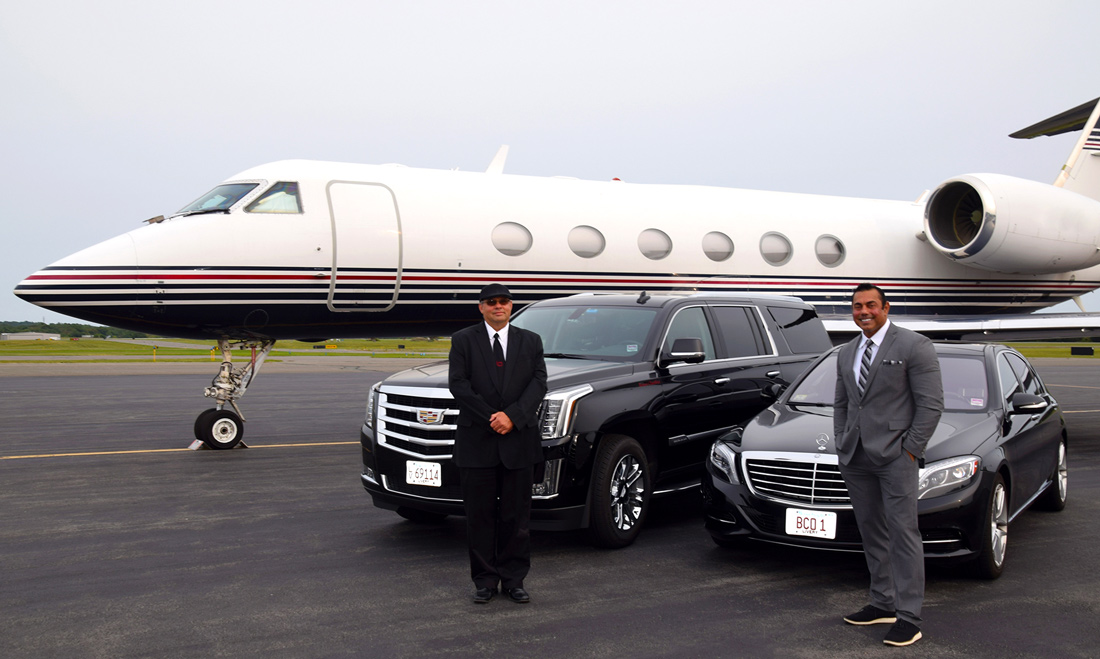 Kini (right) with Chauffeur Mark Decker at the FBO of North Atlantic Air at Beverly Airport
“He’s always willing to do whatever, whether it’s passing out backpacks or toiletries or helping with boxes. The clients are all so grateful. They’re all wearing masks, but you can see it in their eyes. But it’s really a blessing for us because it makes you feel good to be able to help. We couldn’t have done it without people like Mark, his chauffeurs, and the Everett Police, because these deliveries are a job in itself.”
Kini (right) with Chauffeur Mark Decker at the FBO of North Atlantic Air at Beverly Airport
“He’s always willing to do whatever, whether it’s passing out backpacks or toiletries or helping with boxes. The clients are all so grateful. They’re all wearing masks, but you can see it in their eyes. But it’s really a blessing for us because it makes you feel good to be able to help. We couldn’t have done it without people like Mark, his chauffeurs, and the Everett Police, because these deliveries are a job in itself.”
With so much bad news swirling around in the past several months, Kini also made a concerted effort to eliminate as much negativity out of his life as possible and replace it with like-minded people and much smaller doses of media.
“I had to stop watching the news because it was making me a lunatic and wasn’t benefiting me. I surrounded myself with good people who have a similar business outlook, including my business coach. Even though there is uncertainty with COVID, at least I have a roadmap to give me some guidance. I also have a small but tight-knit group of peers who I reach out to. We formed the Global Limo Recovery Group back in March, and we meet weekly via Zoom to discuss what’s going on. We invite guest speakers for some really useful dialogue.”
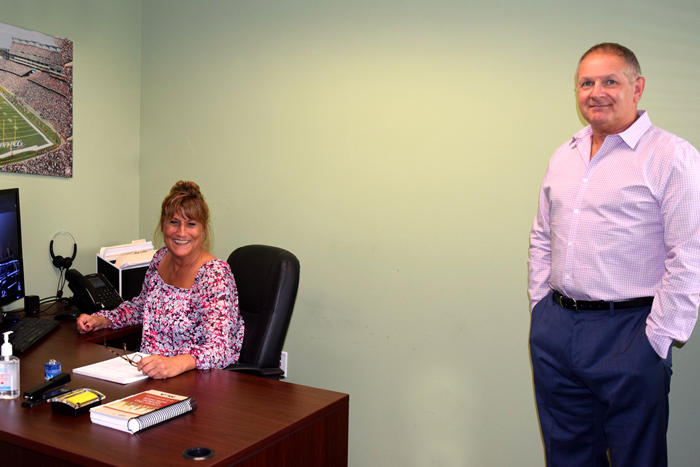 Office Manager Kristen Burt and Logistics Manager Frank Moss
He says there are moments of frustration, like the fact that he’s been working close to 90 days straight, and is baffled by the absolute gridlock preventing Congress in passing a second and much-needed draw on the PPP. Still, he is determined not to let those setbacks derail him, and he counts on his colleagues to keep him motivated as much as working at Everett Grace keeps him grounded.
Office Manager Kristen Burt and Logistics Manager Frank Moss
He says there are moments of frustration, like the fact that he’s been working close to 90 days straight, and is baffled by the absolute gridlock preventing Congress in passing a second and much-needed draw on the PPP. Still, he is determined not to let those setbacks derail him, and he counts on his colleagues to keep him motivated as much as working at Everett Grace keeps him grounded.
“We get set in our ways and we think we know a lot, but we should always be open-minded to learning something new. I’ve been guilty of that. It’s been such an eye-opener to see how customers, especially retail customers, want to communicate differently. I was working with a customer who just wasn’t getting the concept of what a limovan was. She kept insisting on a limousine. So I texted her photos—and then she understood and confirmed the reservation. Now I have a series of photos with people enjoying our vehicles ready to send to clients. We have to change as operators to accommodate new customer behaviors, and the more options we can give them, the better the chances that we can convert into a sale. Speed is the new currency,” he says.
While much of what Kini is doing is on the fly to meet the challenges of the time, he does credit some important moves he made during his two decades in business with helping to position his company for a recovery. Back in 2014, Kini decided to transition his fleet into Mercedes-Benz vehicles to distinguish himself from the steep competition in his area.
“Boston is such a crowded market with really great, well-respected companies so I had to differentiate my business,” he says about the adoption of E-Class and S-Class sedans and Sprinter vans. “One of the silver linings was I started seeing much fewer price-sensitive clients: My revenue per ticket started going up and I increased my repeat clients, so there were tangibles that proved to me that it was a smart decision. I also formed a really solid relationship with Mercedes-Benz corporate and [Manager of Fleet Operations] Larry Henderson. I know that Mercedes has been making an effort to be more involved in our industry, so I think it’s a great story for them. Plus, those vehicles retain their resale value, which was beneficial when I had to start downsizing my fleet.”
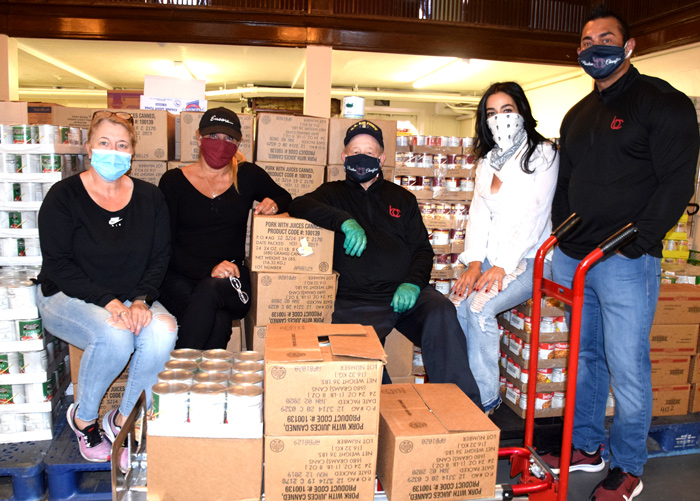 Kini (far right) with the Pantry crew (L to R): Anne Stewart, Irene Cardillo, Chauffeur Jim Davis, and Dede Forgione
He currently runs about 10 vehicles, reduced from 18, which include Mercedes, Lincoln, and Cadillac SUVs; Sprinters; and a Grech minibus.
Kini (far right) with the Pantry crew (L to R): Anne Stewart, Irene Cardillo, Chauffeur Jim Davis, and Dede Forgione
He currently runs about 10 vehicles, reduced from 18, which include Mercedes, Lincoln, and Cadillac SUVs; Sprinters; and a Grech minibus.
Retaining those higher-end client accounts has been a significant part of his business of late. Many people are concerned about using other forms of transportation, including Uber, and appreciate the extra attention to providing a clean and safe vehicle. In fact, Kini reports that August was the first profitable month since the March lockdown.
“It’s been a blessing because working with the Everett Grace Food Pantry has been like chicken soup for my soul ...”
“We have a couple of high-net-worth clients, including one who has been using us almost daily as a direct result of the pandemic. He has some very special needs and provided detailed instructions on safety that we follow to the letter. He’s an adventurer, so he’ll take one of our vehicles out for three to four days at a time. We’ve also seen a consistent uptick in retail clients, whether it’s date nights, anniversaries, or small wedding ceremonies. Corporate work has been slow; Boston is now a ghost town. We did some retail work before COVID, but it was part of my plan for 2020 to pivot into more retail.”
His detailed protection measures—which include the usual required masks and thorough cleaning protocols as well as the use of electrostatic cleaning machines similar to those used by airlines and hotels and “cleaned and sanitized” stickers placed in vehicle door jams broken only by clients—has also yielded some inquiries from first-time clients. He’s been devoting a lot of energy to marketing on social media channels and through email promotions, although he aims to balance promotion and useful information when communicating with clients.
“I got a call from a father who sends his kids to private school. They used Uber last year, but now he’s worried about COVID and safety, so he asked us for some rates and we’re in the middle of negotiating a contract. That’s a direct byproduct of COVID, one that I don’t think would have happened otherwise. I’m turning over every rock I can because the opportunities are there,” he says.
With all the chaos, having a routine is lending Kini some clarity. Save for a trip to see his mother and sisters in California back in June, and a brief visit with his daughter—who is a senior at Rutgers University in New Jersey—he’s grinding it out. It’s wearing on him, but he remains determined. He sticks close to home to avoid, for example, having to handle an awkward customer reservation call in the middle of the grocery store. Although he’s always been a healthy guy, he’s taken up running, stretching, and meditating nearly daily and trimmed down by 30 pounds. Reading has become a regular habit to stay motivated.
“Now I say, ‘You absolutely are going to get to the other side of this,’ and truly believe it, because you’re not going to survive it if you don’t have that mindset. I had to find that emotional maturity. My Plan B is to make Plan A successful.”
A special thank you to North Atlantic Air for allowing the use of their facility at Beverly Airport. [CD0920]

